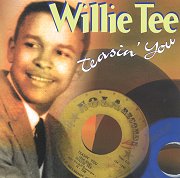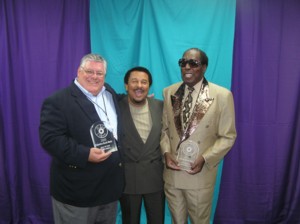 |

HOMEPAGE LATEST NEWS PHOTO ALBUM DISCOGRAPHY FAVORITE LINKS
 Latest News
Latest News
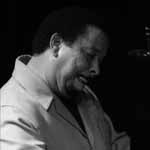
november 7 - 11, 2006
w i l l i e t e e t u r b i n t o n t r i o
legendary pianist from new orleans exclusively in marians for the first time!
exclusive
in switzerland!
in marians for the first time!

7. - 11. november 2006
w i l l i e t e e t u r b i n t o n t r i o
Singer, songwriter, arranger, composer, pianist and producer, Willie Tee is a legend rich in taste and tradition. From expressive pop to stirring soul to modern jazz to ferocious funk, Tee has helped to shape the Sound of New Orleans for more than four decades. Willie was born on February 6, 1944 and raised with his brother, the legendary saxophonist Earl Turbinton, in New Orleans. He had his first Top 20 R&B hits in 1965 and regularily played huge theaters with his band, often joined by the greatest soul stars of the 60's. He worked, played and/or recorded with Cannonball Adderley, Nat Adderley, The Wild Magnolias, Herbie Mann, Joe Zawinul's Weather Report, Carl Anderson, Dr. John and many others and also had a small part in the Oscar-winning movie "Ray!". This summer, Tee was formally recognized by the Office of the Governor of Louisiana for his contribution to the evolution of Mardi Gras Indian music. This legendary New Orleans musician is bringing his trio to Marians for the first time!

![[IMAGE]](waveseparator.gif)
A Jazz Diaspora Redraws the Musical Map
Even as New Orleans rebuilds, some fabled players have decided not to return
By JOHN JURGENSEN
April 8, 2006
Sweet Lorraine's Jazz Club in New Orleans was a popular spot for local music, drawing crowds who came to hear Wilson "Willie Tee" Turbinton, a renowned pianist and singer. The club reopened in February -- but without Willie Tee. Mr. Turbinton has moved to New Jersey. "I'm in a good position here," he says.
New Orleans is busy rebuilding from Hurricane Katrina. But when it comes to jazz, the city's most important cultural touchstone, it's becoming evident the damage could be permanent. Dozens of musicians who relocated temporarily now say they don't plan to return, in part because they're making better money elsewhere.
WHERE THEY ARE NOW
See
our guide on where to hear New Orleans' transplanted musicians.This is redrawing portions of the country's musical map, energizing the jazz scene in cities like Portland, Ore., and Houston. That's a boon, of course, for music fans outside the Bayou State. But for some storied clubs in New Orleans, it means scrambling to find replacements for big draws.
"New Orleans never treated its musicians well," says Wynton Marsalis, the trumpet player and artistic director of New York's Jazz at Lincoln Center.
Some transplanted musicians say they don't expect to attend the New Orleans Jazz and Heritage Festival. The high-profile event has taken on special meaning this year, and is being billed as a homecoming for the city's musicians. But Henry Butler, a noted jazz and blues pianist who's played at the festival for years, says he turned down an invitation to play this time.
The payment offered was "very insulting," says Mr. Butler. He's been house-hunting lately near Boulder, Colo., where he relocated in the fall. These days, "my paydays are better" than they were in pre-Katrina New Orleans, he says.
Jazz Fest organizers say they made Mr. Butler a generous offer, and that out of 400 acts on the festival's bill, 90% are New Orleans artists -- more than ever before. The event features other types of music as well, and its headliners include Bruce Springsteen, who recently released an album in tribute to folk musician Pete Seeger.
For Cyril Neville, the youngest of the city's four famed Neville brothers, Texas has replaced New Orleans as his home. He recently bought a house in Austin. Several brass bands, including ones led by popular trombonist Corey Henry, are now settled in Houston. Bill Summers, a Grammy-nominated drummer who's recorded with Herbie Hancock, has moved to Atlanta, and plays gigs there with both New Orleans transplants and locals.
About 50 players moved into hotel suites in Portland after being recruited for the Portland Jazz festival in February; more than a dozen have decided to stay for good. One of them, trombonist Stephen Walker, along with his funk band, the Few Chosen, now plays every Thursday at the Blue Monk, a Portland jazz club. The Blue Monk's co-owner, Tim Gallineau, says the club has seen a surge of fans of the New Orleans sound. Crowds "come and they don't leave," on such nights, he says.
Displaced New Orleans musicians say they didn't fully appreciate how much better the financial opportunities were in other cities until the hurricane forced them to relocate. For all but the biggest names, a night's work for a band at a New Orleans club -- typically four hours for two sets -- pays less than $500 a night. Split among an eight- or 10-piece brass band, this can mean as little as $50 a gig.
Traditionally, many New Orleans musicians offset their low wages by joining forces with several bands and performing in up to three venues in a night. Even so, musicians say earning about $20,000 a year was typical in New Orleans. This was partly a function of having so many players in one city; there was always someone else willing to work for less money.
For their part, club owners say they've struggled under the same system as musicians. In a city packed with music clubs, patrons are reluctant to pay more than $5 at the door -- many clubs have no cover charge at all. The manager of one New Orleans club, which doesn't usually charge a cover, says the midsized venue typically brings in about $3,000 on a strong weekend night from drink sales, or about half that on weeknights. In some clubs, bands earn a cut of that money -- usually 20% -- plus tips and free beer. If there's a cover charge, the band typically takes 80% of that.
Outside of New Orleans, cover charges are far more common at jazz clubs. At one club in Portland, musicians take in all of the door fees of up to $8 a person, which may amount to about $1,200 a night. In Houston, at the club St. Pete's Dancing Marlin, where displaced brass bands from New Orleans perform regularly, band members make $200 each for a gig, according to the club's owner, John Zotos. John Williams, a washboard player who performs there, says that's double what he typically made in New Orleans.
Of course, returning to New Orleans is a complicated decision for any former resident, given the level of rebuilding needed before the city can truly return to normal. Other musicians who haven't returned say their absence is temporary -- but add it could be years before they move back.
Some New Orleans clubs say it's hurting their ability to draw customers. At Sweet Lorraine's, owner Paul Sylvester Jr., says Willie Tee was a jazz legend who brought in tourists. "Right now, it's real difficult without him. I have to make do with what's available to me," he says.
Since October, Mr. Turbinton has been an artist in residence at Princeton University, lecturing, performing and directing two campus bands. He was supposed to stay only until January, but his residency was extended, in part at the prompting of authors and Princeton professors Toni Morrison and Cornel West. To fill the void, some clubs are looking beyond jazz and other traditional New Orleans sounds like zydeco. They're turning to cover groups who play popular music from the '70s and '80s.
At Bourbon Vieux, a private-party space in the French Quarter, sales and marketing director Annette Huth says she used to book mostly local jazz combos and funk bands. But lately, with her go-to musicians scattered and her convention clients staying home, she's been hiring cover bands to play for visiting fraternities from Louisiana State University.
To try to lure bands back for occasional gigs, some club owners are turning to aid money offered by nonprofit groups. John Blancher, the owner of Mid-City Lanes Rock 'N' Bowl, recently booked a New Orleans piano player living in Atlanta with the promise of a $350 payment, plus an extra $100 from the New Orleans Musicians' Clinic, which provides health care and support to the city's musicians.
As for the musicians who stayed behind in New Orleans, some have benefited from the thinning of musical competition. Bassist Jeff Tyson says his Ka-Nection Band, which used to play about four nights a week, now works virtually every night as one of the few R&B bands working on Bourbon Street. "That's why I'm spread so thin. There's nobody here," he says.
"Clubs fighting over us? Hey, it's about time you see something like that."
Write to John Jurgensen at
john.jurgensen@wsj.com![[IMAGE]](wsj1.gif)
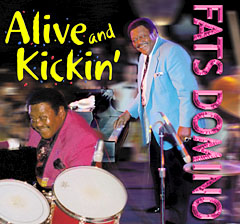

The Tipitina's Foundation has announced that legendary R&B and rock 'n' roll singer, songwriter and pianist, Antoine Dominique "Fats" Domino Jr., is donating proceeds from his new album "Alive and Kickin'" to the Tipitina's Foundation, a 501(c)(3) non-profit organization dedicated to music education, music business development, and preserving Louisiana's unique musical cultures.
"Alive and Kickin'" is Fats Domino's first new release since "Christmas Gumbo" in 1993. "Fats was looking for a meaningful way to give back to his hometown after Hurricane Katrina," said Tipitina's Foundation co-founder Roland von Kurnatowski. "He made it very clear that he was making this donation to us because he felt it was important to support the Foundation in its efforts to rebuild the New Orleans music community."
In a scene that played out on television screens around the world, on September 1, 2005, the 77-year-old Domino was rescued from the roof of his flooded home in New Orleans' Lower 9th Ward by a Coast Guard helicopter. After spending time in a shelter and apartments in Baton Rouge, the Domino family returned to New Orleans in October to begin rebuilding their home.
"This album is a soulful musical message from Fats to his millions of fans around the world that he, the people of his beloved city of New Orleans, and its vibrant musical community are ‘Alive and Kickin'" said Bill Taylor, Director of the Tipitina's Foundation. Eleven of the album's 13 tracks were recorded over the decade prior to Hurricane Katrina, but the effort took on a renewed sense of urgency for Fats as his hometown has pulled together to rebuild.
Fats Domino's "Alive and Kickin'" is only available online at www.tipitinasfoundation.org. A CD can be obtained by making a donation to the Tipitina's Foundation. All Foundation proceeds will go toward helping save and rebuild the New Orleans music community. By supporting musicians who have suffered devastating losses from displacement, homelessness, and a lack of jobs and instruments, Fats Domino and the Tipitina's Foundation are ensuring that New Orleans' unique musical heritage will be preserved.
Carolina Beach Scene
On November 13th Willie performed at the annual Carolina Beach Music Awards (CBMA) in Myrtle Beach. He was the hit of the show and wowed the audience with his Teasing You, Walking Up A One Way Street and Thank You John. He was also inducted into the CBMA Hall of Fame during that event. Willie Tee is most definitely a Carolina Beach Music Icon.
Steve Jarrell, Willie Tee and Clarence Carter with their CBMA Hall of Fame Awards
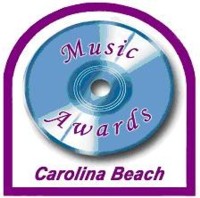
ABOUT WILLIE TEE
In a city of musical treasures, Willie Tee is a jewel in the crown of the Crescent City. Singer, songwriter, arranger, composer, pianist and producer, he is a legend rich in taste and tradition. From expressive pop to stirring soul to modern jazz to ferocious funk, Tee has helped to shape the Sound of New Orleans for more than four decades.
Born on February 6, 1944 and raised in New Orleans' Calliope projects across the street from the brothers Art, Aaron and Charles Neville, of the Neville Brothers family; music kept Tee and his brother, the legendary saxophonist Earl Turbinton, out of trouble.
Weaned on equal parts of bebop, Little Richard’s rhythm & blues and the indomitable beat of a New Orleans street parade, Tee was touched at a tender age by the keyboard masters Red Garland, Wynton Kelly, Oscar Peterson, Horace Silver, Art Tatum, McCoy Tyner and Jimmy Smith.
In fact, he still affects the charm of the mischievous teenager who scored a Top 20 R&B hit for Atlantic Records in 1965 with "Walking Up A One Way Street" "Teasin’ You," and later "Thank You John," and played the Apollo Theatre with his band, Willie Tee and the Souls, on packaged tours with the greatest soul stars of the Sixties.
Soon he was turning out ferocious funk with the Gaturs. And as his chops matured, he caught the attention of the jazz giants Julian (Cannonball) Adderley and his brother, Nat Adderley, who signed Tee to their production company. The result was I’m Only A Man, which Capitol released in 1968.
But Tee will be forever known as the musical architect of The Wild Magnolias, the fabled Mardi Gras Indian group; he wrote, arranged and co-produced their ground-breaking Polydor albums The Wild Magnolias (1973) and They Call Us Wild (1974). A melange of funk, jazz and Mardi Gras Indian soul, the Magnolias’ debut was called "one of the funkiest albums ever" by music critic Peter Watrous of The New York Times; this summer, Tee was formally recognized by the Office of the Governor of Louisiana for his contribution to the evolution of Mardi Gras Indian music.
During the Nineties, hip-hop culture caught a whiff of Tee’s intoxicating brew. First, the Geto Boys of Houston, Texas, sampled "Smoke My Peace Pipe," which Tee wrote for the Magnolias. Then rap impresario Sean (P Diddy) Combs sampled "Concentrate," which Tee wrote for the Gaturs; it was one of the most –played cuts on Combs’s 1997 No Way Out project, which sold seven million copies worldwide.
As radio programmers and record producers search out the roots of modern soul music, Tee’s Anticipation album (United Artists, 1976) has become one of their most satisfying sources; it’s centerpiece, "I’d Give It To You," was released in 1998 on Sex & Soul Vol. 3, part of EMI’s Heart of Soul series. Because long before radio consultants invented the Adult Contemporary and Quiet Storm formats, Tee was creating music for dancing, romancing and thinking.
Music aficionados have been celebrating Tee’s magic and mystery for years at New Orleans Jazz & Heritage Festival; at the Fairgrounds in 2004, he accompanied the late Herbie Mann on what became Mann’s last performance. And the British are still talking about the standing-room only performances that Tee put on in 2002 when he fed the funk-starved patrons of London’s famed Music Café with hours of sun-kissed music from the wellspring of all things New Orleans.
Among his peers, Tee counts Cannonball’s pianist, the great Joe Zawinul, as one of his biggest fans. Consider that when Zawinul was mixing his strange new brew in the mid-Seventies called Weather Report, he asked Tee to stir up the funk and make it fizz. Tee obliged with a song called "Can It Be Done." Sung by the late Carl Anderson on their 1984 Domino Theory LP, it represents one of the few times Zawinul and Weather Report recorded a vocal performance.
Most recently, Tee was a featured guest and collaborator on Dr. John's latest disk, N’Awlinz: Dis Dat or d’Udder (Blue Note, 2004). He also had a small part in the Oscar-winning movie Ray!
An avid golfer, Tee can be found on the links almost every day. Then it's off to pick up his grandchildren from school; evenings are devoted to composing music.
Most recently Willie appeared at the Carolina Beach Music Association Awards show at the Alabama Theater in Myrtle Beach and stole the show with his rendering of Teasing You, Walking Up A One Way Street and Thank You John true to the original recordings for Nola and Atlantic Records. The Part Time Party Time Band ably backed him up.
Presently he is the artist in residence at Princeton University in New Jersey.
"I am truly blessed," he says. "The Creator has a plan, and he’s given me a very special gift."
The "Buy It, Don't Burn It" Campaign
This is to bring awareness to those that are downloading music and that do not realize that they are costing the recording artists and writers money that cannot be replenished if the music is not purchased.
WILLIE TEE's JUKEBOX
I Heard Everything You Said
Reach Out For Me
Love Of A Married Man
I'm Only Man
Take Your Time
Bring On The Heartaches
First Taste Of Hurt
I'm Havin' So Much Fun
Teasin' You Again
Come To Me
I'd Give It To You
The Moment Of Truth
Many music clips require a software program, Real Player, in order to play the selection after download.
Please click here if you do not already have/or want to update Real Player...it's free...
You can minimize this page and go to another web site and continue to have the music play.
©2006 Wilson "Willie Tee" Turbinton Last Updated 10/30/2006 2:00PM EST
